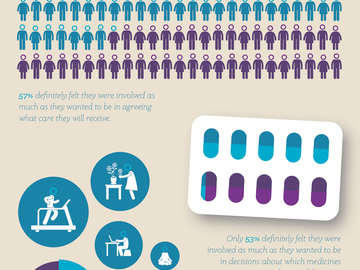What Do the Community Mental Health Survey Results Really Mean? By the Picker Institute Europe
Last week the Care Quality Commission (CQC) published findings from a major new survey: The Community Mental Health Survey. Developed and co-ordinated by the Picker Institute, it overwhelmingly showed that too many people have poor experiences of community mental health services.
The Community Mental Health Survey, completed by more than 13,500 service users, found that less than a half (48%) of users felt they had seen someone from mental health services often enough and only two in five (43%) said that mental health workers 'always' understood what was important to them in their lives.
Commenting on the results, Dr Andrew McCulloch, the Picker Institute's Chief Executive, said: “People using mental health services want to be treated as individuals and supported to be involved in their care. But this survey, developed with input from service users, shows some serious shortcomings in the mental health services that people are experiencing. Large proportions of service users report that they are not as involved in their care as they would like to be or that the service does not support them in their lives and goals. In particular, we are concerned that only a minority of people say that mental health services 'definitely' help them to feel hopeful, understand what matters to them, or help them with the things that are important to them. These are the hallmarks of a personalised and effective service and there absence gives cause for alarm.”
“It's also very worrying that one in three people are not told who to contact in a crisis – and that one in five of those who do try to contact someone in a crisis don't get the help they need. It's vital that people who need urgent help for mental health conditions can get it; if they don't the consequences can be truly tragic.”
Results from the survey, including detailed results for all mental health trusts in England, are available at http://www.cqc.org.uk/content/community-mental-health-survey-2014.
Continuing, Dr McCulloch said: “We're calling on mental health providers across England to take a long and careful look at today's results. Some of the findings may make for uncomfortable reading, but they also point the way making meaningful improvements in the things that matter most to service users. Trusts should work with their local service users to review the survey findings and prioritise changes to improve personal care and support.”
Ends
NOTES TO EDITORS:
Further information and survey results are available on the CQC website athttp://www.cqc.org.uk/content/improvements-needed-community-mental-health-care
The survey was designed by the Picker Institute on behalf of the CQC.
The survey was developed with extensive input from service users and stakeholders, and we acknowledge the kind support of all of those who contributed their views and experiences to this process.
13,787 people responded between March and June 2014.
For all Picker Institute Europe media enquiries, speaker opportunities and recent news please contact: Lanisha Butterfield onLanisha.butterfield@pickereurope.ac.uk or 01865 208166 / Out of hours: 07825952160
For further information visit http://www.pickereurope.org/
Press Contact:
Lanisha Butterfield
t: (0)1865 208166
e: Lanisha.Butterfield@PickerEurope.ac.uk
Press release distributed by Pressat on behalf of Rage Communications, on Tuesday 23 September, 2014. For more information subscribe and follow https://pressat.co.uk/
Health
You just read:
What Do the Community Mental Health Survey Results Really Mean? By the Picker Institute Europe
News from this source:


